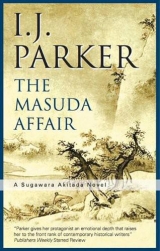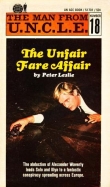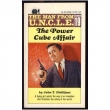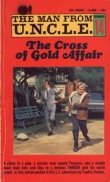
Текст книги "The Masuda Affair "
Автор книги: Ingrid J. Parker
Жанр:
Исторические детективы
сообщить о нарушении
Текущая страница: 21 (всего у книги 21 страниц)
TWENTY-SIX
The Masuda Women
When Akitada returned to Otsu, Judge Nakano brushed away Akitada’s thanks and returned his gold to him with many apologies. He greeted Tamako courteously, and then looked with interest at the boy. Dressed in Yori’s clothes, and with his hair neatly parted and tied, he looked like a handsome noble child.
Nakano shook his head. ‘I find it hard to believe that this is the same boy you found. Both Mimura and his wife were dealing in pirated goods. We found their storehouse filled to the rafters with evidence and put a stop to a notorious pirate who has been working on the lake.’
Akitada said, ‘Good,’ and added, ‘we are on our way to speak to the Masudas.’
‘You think the child is theirs? Come to think of it, young Masuda kept a courtesan. Is that it? Can you prove it?’
‘Young Masuda acknowledged Peony as his concubine, and we know the boy is his son.’
‘Extraordinary! Good blood shows, doesn’t it? But the Masuda ladies will hardly welcome him.’
Akitada sighed. ‘I must do my best for him. Thank you again for your support.’
At the Masuda mansion, the ancient servant opened the gatehouse window. He shook his head stubbornly when Akitada demanded to see the old lord. ‘The first lady has forbidden it,’ he said.
‘This doesn’t concern her. It concerns your master.’
‘She doesn’t wish my master to be upset again.’
‘Life has a way of upsetting us, ‘Akitada said coldly. ‘If Lord Masuda had looked after his family better, his friend Inabe need not have died.’
The servant opened his mouth to object, but then just shook his head again. ‘I don’t dare, sir.’
‘Look,’ Akitada said, losing his patience, ‘I have come with my wife and with Lord Masuda’s grandson, his son’s child by his concubine Peony. Would your master not wish to meet him before he dies?’
‘B–but,’ stammered the old man, ‘that cannot be. You must be mistaken, sir. That child is dead. Lady Masuda said so herself
‘Why is everyone in this household taking her word for things?’
The old man hesitated. ‘Amida!’ he whispered. ‘Are you sure?’
‘Yes,’ Akitada said firmly.
The servant’s resistance crumbled. ‘Well, it is one of his good days, and the ladies are at a service for poor Mrs Ishikawa. Did you know she died on her pilgrimage?’
Akitada nodded.
‘Surely a blessed occasion,’ the servant said.
Akitada had no wish to discuss Mrs Ishikawa’s blessed or unblessed state. He waited until the old man opened the gate. When the servant saw the child in Tamako’s arms, his eyes widened. ‘Amida,’ he said. ‘He’s his father’s image.’
‘This is Lady Sugawara.’ Akitada handed the child down to the old man and helped Tamako dismount.
The old man paid no attention. He held the boy and crooned, ‘Oh, my little master, how very handsome you are. I used to serve your father when he was just your size.’
The boy smiled at him.
Akitada said, ‘Perhaps we should have him meet his grandfather now.’
The old servant was still looking at the child with joy and amazement. ‘Oh, dear, the ladies will be back any moment. I don’t know what they’ll say. Let’s be quick.’ He led the way.
Lord Masuda turned his head when they entered. He said nothing, but narrowed his eyes.
Akitada took Nori’s hand and brought him to the old lord. ‘My name is Sugawara,’ he said. ‘I was here once before, sir. Today I returned with my wife to bring you your grandson.’ He told the child, ‘Bow to your grandfather.’
Nori made a very creditable bow and a small noise in the back of his throat. Letting go of Akitada’s hand, he went to touch the old lord’s gnarled fingers with his small ones. Lord Masuda looked long and searchingly at the child and from the child to the painting of his son. Akitada held his breath.
‘Yori?’ Lord Masuda’s voice was thin as a thread. ‘Is that really you, Yori?’
The boy nodded, and Akitada’s heart missed a beat. He looked at the servant.
The servant was wiping tears from his eyes. ‘His son’s name was Tadayori. The child looks just like him at that age. We used to call the young master Yori.’ He gestured to the painting.
Akitada looked at the image of the younger Masuda and saw that his eyebrows almost grew together and slanted upward a little at the temples – as did the child’s. He took a deep breath. His own Yori had been Yorinaga – but the coincidence moved him profoundly.
He had crossed paths with this child on that rainy night of the O-Bon festival. In the darkness of his heart he had mistaken him for his son’s ghost and called out his name, and the child had come to him. For the span of that night and a day, he had lived in the dream of having a son again. They had encountered a cat who had led him to Peony’s villa, and everything else had followed – so many things, including his own salvation. Somehow they had reached this moment, he and the boy – a grieving father and a fatherless child.
The old lord looked at him. ‘Where did the child come from?’
‘My Lord, when I was here earlier, I spoke to you about your son and the courtesan Peony.’
‘Peony?’
‘They had a child, a boy, born five years ago. Your son acknowledged the boy as his. This is that child.’ Akitada did not know this for certain, but young Masuda’s return to Peony implied as much.
Lord Masuda looked from Akitada to the boy and then back again. ‘He resembles my son,’ he said. His gnarled hand stretched out and traced the child’s eyebrows. ‘What is your name, boy?’
The child was struggling to speak when the door opened abruptly and Lady Masuda swept in, followed by Kohime. ‘What is going on here?’ she demanded, taking in the scene and singling out Akitada, anger flaring in her face. ‘I told you my father is not well.’
Akitada’s eyes were on the boy. He had a sudden premonition of what was to come. Lady Masuda had finally met her retribution.
But the boy looked past the first lady. His face crumpled, and the small boy erupted into violent movement and speech.
‘Sh–she … k–killed her,’ he screeched. Before Akitada could stop him, he dashed past Lady Masuda and threw himself at Kohime, fists flying. ‘She killed my mother. She did it.’
Kohime screamed, gave the child a violent push, and fled from the room.
Akitada caught the boy in his arms. The child was shaking with a storm of grief and anger, but he was still talking, a flood of incomprehensible syllables of loss and anger. Akitada had guessed the wrong killer, but his heart was filled with joy. ‘So you found your voice,’ he said, hugging him. ‘All will be well now.’
‘M–my m–mother,’ sobbed the child, pressing his wet face against his neck.
‘Shh,’ Akitada patted his back. ‘Your grandfather will take care of it.’ And somehow he knew that it would be so. The old man was far from senile; he had merely been submersed in grief and loneliness for too long. He was very alert now and fidgeted with suppressed emotion. And he was looking straight at Lady Masuda.
She was very pale, but her eyes devoured the child. ‘Thank the gods, he is alive,’ she whispered. Oh, thanks to the blessed Amida, he’s alive. How did you find him? I have searched everywhere.’
‘Are you responsible for this?’ the old lord shouted, his eyes flashing. ‘He looks like your husband. Is that why you tried to get rid of him?’
She ran to him and knelt, weeping. ‘No, Father, I wanted him. I meant to give that woman all the money we had for him.’
The old man’s claw-like hand pointed a shaking finger at her. ‘You lied to me. You took my son’s son from me.’
She shrank away.
Akitada said, ‘If you would allow me …’ He turned to the boy, ‘What is your name?’
‘Yori,’ said the child, as if the question were foolish. ‘Like my father.’
Lord Masuda’s face softened. ‘Yes, Yori, like his father.’
Akitada said, ‘Well, then perhaps Yori might stay with my wife while Lady Masuda explains.’
‘Oh, please let me take him,’ cried Lady Masuda, rising to her knees.
‘No,’ said her father-in-law, ‘you will stay here and make a clean breast of this.’ He told the servant, ‘Fetch my other daughter.’ As soon as they had gone, he asked, ‘Now, daughter, why did you lie to me about my grandson and his mother?’
She bowed her head. ‘Forgive me, Father. I wished to spare you. You were so ill after my husband died. And you blamed that woman.’
‘That does not excuse your lies.’
She cried, ‘It’s true I was a little jealous, especially after she gave him a son while I was still childless. But after my own son was born, I no longer minded so much.’
‘My son wished to live with that woman and her child. I did not approve, but as he had given me an heir, I permitted it. It was none of your business.’
‘When Mrs Ishikawa said Peony had killed my husband, I reported it to you, but nothing was done, and then my own son passed from this world—’ Her voice broke, and she whispered, ‘You should know what losing a child will do to a parent.’
The old lord compressed his lips, but his expression remained cold. ‘Go on.’
For a moment she trembled on the verge of more tears, then she squared her shoulders and said, ‘It was then that I became obsessed with my husband’s paramour and her child. I had to see her. Kohime was very understanding. She came with me. It was … strange. She was very beautiful, much more beautiful than I. I could see they were poor, and I was glad. I saw the boy playing with his kitten, and I thought if we could buy the child from her, I could raise him. I told his mother I would return with money. She seemed grateful, and he was a sweet boy and my husband’s son.’ She looked pleadingly at Lord Masuda.
He grunted. ‘Because I disliked and distrusted the woman, I believed you when you came to me with the story that she poisoned my son. But if you had brought the child to me, I would have adopted him.’
Lady Masuda wiped her eyes. ‘I went home and gathered up all the gold I could find, and Kohime added what she had saved, and then we went back to her. We told her what we wanted, but she became hysterical and cried she would rather die than sell her child. She snatched up the boy and ran into the garden with him. I was afraid she would do him some harm. Kohime ran after her and tried to take the child.’
Lord Masuda raised a hand to stop her. ‘Here is Kohime now. Let her speak for herself.’
Kohime’s round face was splotchy from weeping, and her hair was disheveled. She threw herself on the floor beside her sister-in-law and knocked her head against the boards. ‘I didn’t mean to kill her,’ she wailed. ‘I thought she was running into the lake with the child and grabbed her. It was an accident, Father.’
The old lord sighed deeply. ‘So you killed her.’
‘We struggled and fell down. She bit and kicked me. She was very strong and I was afraid. My hand found a loose stone on the path and I hit her with it, but she didn’t stop. So I kept hitting her until she stopped moving. I didn’t mean to kill her. I just wanted her to let go of me.’ She burst into more violent tears.
Lady Masuda stroked Kohime’s hair. ‘It was an accident, Father. The boy was trying to help his mother. He had a wooden sword, and he stabbed at Kohime with it. I saw it all from the veranda. When Kohime came running back to me, she was bleeding. I took her into the house to stop the bleeding. She said she had killed that woman.’
A heavy silence fell. Kohime wept quietly. After a moment, Akitada asked, ‘Did you go back to make sure Peony was dead, Lady Masuda?’
She nodded. ‘We were terrified, but we both crept out to look. She was still lying on the path. The boy was beside her, holding her hand. Kohime said, “We must hide the body.” But there was the boy. We could not bring him back here after what had happened.’ She paused and gave her father-in-law a pleading look. ‘We were very frightened that this trouble would bring shame to the family. We thought perhaps we could make it look as if she had fallen into the lake by accident. I would take away the boy, while Kohime would hide the body because she is the stronger. I tried to talk to the child, but it was as if his spirit had fled. His eyes were open, but that was all. He let me take him, and I carried him away from the house. I did not know what to do with him. When I came to the fish market, I saw a woman packing up to return to her village. I offered her all the money we had brought to take the child.’
Akitada muttered, ‘All that gold, and the Mimuras beat and starved the boy.’
She flinched as if he had struck her.
Lord Masuda moved impatiently. ‘And you, Kohime? What did you do?’
Kohime, the peasant girl in the fine silks of a noblewoman, said with childlike simplicity, ‘I put Peony in the lake. It wasn’t far. People thought she’d drowned herself.’
‘Amida!’ exclaimed Lord Masuda. ‘What a fool you are. You are both fools and you deserve to be punished. I do not care what happens to either of you.’
Akitada looked at the two women who had caused such tragedy: one because she was a simpleton, and the other because she had been half mad with grief and jealousy. He thought what it must have been like to be the rejected wife tending to her dying child and remembered watching his own son die. He said, ‘My Lord, no good can come from a public disclosure now. Peony’s death was a tragic accident. It’s her son’s future that matters.’
The old lord said harshly, ‘Kohime killed another human being.’
‘Not intentionally. Peony drowned after she was put in the lake. I believe it was getting dark, and two hysterical women made the mistake of thinking an unconscious woman dead.’
‘Kohime,’ shouted the old man, his voice trembling with anger, ‘Did you hear that? You idiot! She probably wasn’t dead! You drowned her.’
Kohime stared at him. Her face was swollen, her nose ran, and her mouth gaped. She looked ugly and pathetic. ‘No, she must have been dead.’
Lord Masuda turned from her in disgust.
Akitada cleared his throat. ‘I think that the ladies, no matter how misguided, acted out of loyalty to you and your family. Let’s not forget that they could not consult you in the matter and had no one to turn to.’
‘You are generous,’ Lord Masuda said after a long moment. ‘I will, of course, adopt my grandson and raise him as my heir.’ He glowered at his daughters-in-law. ‘You two deserve to be beaten and sent away for what you did, but my son was unkind to both of you and yet you have stayed here and served me after his death. You shall be provided for if you obey my decision.’
Kohime sobbed, but Lady Masuda said quite humbly, ‘Thank you, Father. We are both deeply grateful.’
Her father-in-law nodded. ‘You, as my son’s first lady, may stay to run this household and raise Peony’s son to atone to him for his suffering. Kohime, you and your daughters will leave my house. You will reside in the lake villa. There you will pray daily for the soul of the poor woman you killed.’ He looked sternly at the two women. ‘Will you agree to this?’
They bowed and murmured their assent. Lady Masuda put her arm around the sobbing Kohime to support her on their way out of the room.
The old lord waited until the door had closed after them before his face cleared. ‘I have a grandson. You have made an old man cling to life again,’ he said to Akitada.
‘There is one request, sir.’
‘I am grateful. Only ask, and it shall be so.’
‘The boy has an uncle. His mother’s brother is a monk. He has only now found out the fate of his sister and her child and hopes to stay in touch. I think you will find him a pleasant and well-educated young man.’
‘He shall be welcome.’ The old lord clapped his hands. ‘Bring my grandson to me,’ he cried.
The boy returned and sat down beside his grandfather.
‘Well, Yori,’ the old man asked, ‘how do you like it here‘I Will you come to live with your old grandfather?’
‘Yes. Thank you, Grandfather. But I would like Patch to live here, too.’
The old lord stroked his hair. ‘Who is Patch?’
‘He’s my cat.’
Lord Masuda looked at Akitada, who said with a smile, ‘Patch still lives in the lake villa. He has been helpful in bringing you and your grandson together.’
‘Then we shall bring him here,’ said the old man and hugged the boy.
As they left the mansion, Akitada said to his wife, ‘I’m sorry we couldn’t keep him, my dear.’
She gave him a watery smile and touched his hand for a moment.
They told Tora what had happened on the homeward journey. He received the news with great satisfaction, ‘What a pair of vicious females! I bet poor Peony thought all was forgiven and that the money was to take care of them. That’s what made her send for Little Abbess. It took a clever mind and a lot of legwork to figure out a nasty tangle like that Masuda affair. We did a fine job, sir, if I do say so myself.’
Akitada smiled. ‘If I recall correctly, you were mostly working on the Fujiwara affair.’
‘The Fuji—? Oh, you mean Sadanori?’
‘Yes. Sadanori had nothing to do with the fate of the child, and he did not kill Peony. He was responsible for only one murder, young Masuda’s, and even that might not have happened if Ishikawa hadn’t urged Sadanori on.’ He shook his head. ‘It amazes me what lengths men will go to for love.’ When nobody spoke, he looked up. ‘Don’t you agree?’ he asked.
Tamako lowered her eyes and murmured, ‘Yes.’
Tora grinned. ‘I’m very glad you got over it, sir. Lately, there’s been no telling what you might do next.’
Akitada looked at his wife, who blushed and said nothing. ‘Oh,’ he said, ‘I must have behaved very badly.’
Tamako said, ‘Not at all.’
Tora muttered, ‘Forget what I said, sir. I didn’t mean it.’
‘No, you were right. I wanted that child’s affection so badly because I miss Yori. Perhaps that’s why I make excuses for Sadanori. And for Ishikawa’s mother and those Masuda women.’
Tamako reached out to squeeze his hand. ‘How they must have suffered! Poor Peony and poor child! And those two women, rejected by their husband and worried about their future. They only tried to buy the boy to give the old lord an heir, and then this terrible thing happened.’
‘Some people are born with bad karma,’ Tora pointed out.
Tamako frowned at him. ‘Not in this case. Women like Peony have to sell their bodies and souls to men.’
Akitada thought guiltily of Little Wave in her pink-silk gown. He looked at his wife.
Tamako looked back and smiled, and suddenly, the sun was bright, the trees green, the colors of his wife’s robe beautiful, and the air was filled with birdsong and the scent of flowers.
Their return journey was like a homecoming after a long absence. Some day they would return to Otsu to visit the child who had come into Akitada’s grief so briefly.
Life places obligations on a man, and he had neglected his for too long.
HISTORICAL NOTE
Kyoto was founded in 794 A.D. as Heian-Kyo (Capital of Peace and Tranquility) and laid out on the pattern of the Chinese city of Ch’ang-An. Thus, its major and minor streets formed a grid-pattern along a north-south axis, with the walled Greater Imperial Palace (Daidairi) occupying the northern center. The Greater Imperial Palace encompassed the emperor’s and crown prince’s palaces, as well as the government buildings, imperial treasury, and guards’ headquarters. The villas and mansions of the nobles and of members of the imperial family clustered around, while the rest of the population of about 200,000 – government officials, civil servants, craftsmen, merchants, laborers and entertainers – occupied the remaining two-thirds of the city. The city was divided into a right and left administration. Such divisions into right and left were common in the government structure and extended even to games and contests. Suzaku Avenue, a broad, willow-lined thoroughfare, formed the dividing line and led straight from the southernmost city gate (Rashomon) to the main gate of the Greater Imperial Palace (Suzakumon). The city is said to have been beautiful, with its broad avenues, its rivers and canals, its palaces and parks; and originally it probably contained some 80,000 dwellings, but by the eleventh century parts of it, notably the western and southern quarters, had begun to deteriorate and the population had shrunk. Among the disasters that preyed on the city and caused its decline were frequent earthquakes, fires, storms, and epidemics (from 806–1073 A.D. there were 653 earthquakes, 134 great fires, and 91 epidemics recorded.) A certain amount of lawlessness accompanied disasters and further drove people to resettle elsewhere.
Heian-Kyo was carefully located to be protected from evil influences – in the north by mountains, in the east and west by the Kamo and Oi Rivers, and in the south by the confluence of these rivers and other rivers in the Ogura swamp. Major highways led south and west to the old capital of Nara and to the Inland Sea and the western provinces, and east to Lake Biwa, and from there to the Northern and Eastern provinces. In addition, there was much travel by water on the major rivers and on Lake Biwa. The foothills around the capital, the shores of Lake Biwa, and Uji (a picturesque setting on the Uji River southeast of the capital) were favored by the nobles for their country retreats or retirement temples. Uji is the famous setting in the final chapters of the eleventh-century novel Genji by Lady Murasaki.
Two state religions, Shinto (a native faith that venerates deities of agriculture) and Buddhism (imported from China via Korea and embraced by the court) coexisted peaceably. The fox shrine mentioned in this novel is a Shinto shrine, while the mysterious monk is a practicing Buddhist priest. The emperor, as a descendant of the native gods, celebrated Shinto rites during his tenure, but often took the tonsure as a Buddhist priest upon retirement or serious illness. A number of annual festivals have quasi-religious significance, among them the three day O-bon (or urabon) celebration, honoring the dead, who are thought to return briefly for a visit to their homes. This celebration has its origin in Chinese ancestral worship and Buddhism.
The government in eleventh-century Japan was also derived from the Chinese model, which was based on education and excellence, but by the eleventh century it had deteriorated into rule by the sons of a few noble families, primarily the large Fujiwara clan. Centrally located in Heian-Kyo, the government controlled, at least nominally, the rest of the country by imperially appointed governors. Akitada, who is essentially a civil servant, currently serves as senior secretary in the Ministry of Justice headed by a Fujiwara minister. Civil servants drew salaries commensurate with their rank and office. Law enforcement was in the hands of a police force and of local wardens, who were responsible for their district and reported serious crimes to the police. Judges worked as adjuncts to the police departments. Because of the Buddhist injunction against taking life, there were few executions. Prison terms were common, though often cut short by frequent imperial pardons, and exile was the preferred punishment for serious crimes.
Relations between men and women in Heian Japan were both more casual and more formal than in western societies. Husbands and wives observed proper courtesies towards each other, but polygamy was permitted, probably because of high child mortality. It was generally practiced only by those who could afford to support large households. A gentleman might have several wives, ranked by importance, as well as several concubines, who might or might not live in the same household. Generally, customs favored males unless a wife had powerful parents. Wives could be divorced or deserted at the whim of the husband – in which case they returned to their families, or he moved out, because bridegrooms often took up residence in the house of the bride. Casual affairs were common for both sexes. Though there is no record of a ‘Willow Quarter’ in Heian-Kyo during the eleventh century, such places existed, most notably along the Yodo River, a mere river pleasure cruise away from the city.
Medicine, as practiced in eleventh-century Japan, was based on Chinese herbal treatises, acupuncture, moxibustion, and a good deal of superstition. Practitioners ranged from university-trained physicians to Buddhist monks and local pharmacists. The medicines mentioned in the novel were all available at the time.
Finally, the psychological concept called ‘the darkness of the heart’ serves to some extent as the theme of this novel. Almost a commonplace in the literature of the period, which made much of human emotions, it refers to the dilemma faced by parents who lose a child. Although Buddhist doctrine insists on denial of all worldly attachments, a parent’s love for and the bitter grief attendant on the loss of a child cannot be denied. The term is found in both poetry and prose fiction of the time, for example in the Tosa Diary and Lady Murasaki’s Genji.


![Книга [The Girl From UNCLE 01] - The Global Globules Affair автора Simon Latter](http://itexts.net/files/books/110/oblozhka-knigi-the-girl-from-uncle-01-the-global-globules-affair-170637.jpg)





